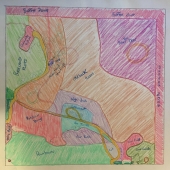
 2
2




 2
2




A human being should be able to change a diaper, plan an invasion, butcher a hog, conn a ship, design a building, write a sonnet, balance accounts, build a wall, set a bone, comfort the dying, take orders, give orders, cooperate, act alone, solve equations, analyze a new problem, pitch manure, program a computer, cook a tasty meal, fight efficiently, die gallantly. Specialization is for insects.
-Robert A. Heinlein




Living in Anjou , France,
For the many not for the few
http://www.permies.com/t/80/31583/projects/Permie-Pennies-France#330873
 9
9




It's never too late to start! I retired to homestead on the slopes of Mauna Loa, an active volcano. I relate snippets of my endeavor on my blog : www.kaufarmer.blogspot.com
 3
3




Living in Anjou , France,
For the many not for the few
http://www.permies.com/t/80/31583/projects/Permie-Pennies-France#330873
 6
6











 5
5




 8
8




 5
5




Iterations are fine, we don't have to be perfect
My 2nd Location:Florida HardinessZone:10 AHS:10 GDD:8500 Rainfall:2in/mth winter, 8in/mth summer, Soil:Sand pH8 Flat
 3
3




Tod duBois wrote:
So several of us are trying to decide how to proceed. We are considering forming some type of national or international property owners association. The idea to become the consumer's guide and reliable technical resource. So much bad and even crazy info on the web. So much waste and potential danger to the environment and more importantly your families economic future.
"Study books and observe nature; if they do not agree, throw away the books." ~ William A. Albrecht










 4
4
 1
1




It's never too late to start! I retired to homestead on the slopes of Mauna Loa, an active volcano. I relate snippets of my endeavor on my blog : www.kaufarmer.blogspot.com
 1
1




A human being should be able to change a diaper, plan an invasion, butcher a hog, conn a ship, design a building, write a sonnet, balance accounts, build a wall, set a bone, comfort the dying, take orders, give orders, cooperate, act alone, solve equations, analyze a new problem, pitch manure, program a computer, cook a tasty meal, fight efficiently, die gallantly. Specialization is for insects.
-Robert A. Heinlein
 1
1




Living in Anjou , France,
For the many not for the few
http://www.permies.com/t/80/31583/projects/Permie-Pennies-France#330873
 1
1




How permies.com works
What is a Mother Tree ?
 3
3




"Study books and observe nature; if they do not agree, throw away the books." ~ William A. Albrecht
 4
4




 1
1




The holy trinity of wholesomeness: Fred Rogers - be kind to others; Steve Irwin - be kind to animals; Bob Ross - be kind to yourself
 5
5




Namaste - the light in me, honours the light in you!!





 1
1




Last Christmas, there was a 4-day power outage. Randy met some of the neighbors as they were walking the trails, and they mentioned some of the problems they had encountered. These people live closer to the road and they are on grid. Randy had not been aware of the power outage.
"Never doubt that a small group of thoughtful, committed citizens can change the world; indeed, it's the only thing that ever has."-Margaret Mead "The only thing worse than being blind, is having sight but no vision."-Helen Keller





 1
1




Be joyful, though you have considered all the facts. ~Wendell Berry
 2
2




The REAL question is is this right for Grandma, your daughter and her children
How do you know if you are now damaging the environment?
How do you know your systems won't start a fire someday and hurt people and property?











 2
2








Tod duBois wrote:Interesting about Australia. Please tell us more about how the local authorities keep people safe in rural Australia.
Namaste - the light in me, honours the light in you!!






Iterations are fine, we don't have to be perfect
My 2nd Location:Florida HardinessZone:10 AHS:10 GDD:8500 Rainfall:2in/mth winter, 8in/mth summer, Soil:Sand pH8 Flat
 2
2




Tod duBois wrote:Myself and many others (off grid experts) are struggling to find a sustainable business model supporting off grid property owners (power, water and waste grids)...
 )
)
Tod duBois wrote:There are lots of retailers making money selling equipment that is usually improperly installed, often unsafe and hard to maintain.
Tod duBois wrote:So much bad and even crazy info on the web. So much waste and potential danger to the environment and more importantly your families economic future.
 2
2








 5
5




Living in Anjou , France,
For the many not for the few
http://www.permies.com/t/80/31583/projects/Permie-Pennies-France#330873




Tod duBois wrote:It remains unclear if the university will allow me to study the off-grid community in an analytical way but who knows. Maybe I can use science instead of opinion in the future
Namaste - the light in me, honours the light in you!!




Tod duBois wrote:Myself and many others (off grid experts) are struggling to find a sustainable business model supporting off grid property owners (power, water and waste grids). The reality long term is that off grid living is not very sustainable. We have yet to see anyone build and maintain any off grid property with utility grade infrastructure thru a full family lifecycle. In other words, when you get old you can't stay in your off grid home. After a decade or so huge amounts of deferred maintenance mean the property and environment get compromised. Of course, if you don't want electricity, internet, water and waste systems that meet EPA standards when you are 80 - that's different.
There are lots of retailers making money selling equipment that is usually improperly installed, often unsafe and hard to maintain.
So several of us are trying to decide how to proceed. We are considering forming some type of national or international property owners association. The idea to become the consumer's guide and reliable technical resource. So much bad and even crazy info on the web. So much waste and potential danger to the environment and more importantly your families economic future.
What do people think?
Tod duBois wrote:Thank you, everyone, for pitching in, a lot of good insight. I've decided to shelf the idea or concept for awhile and return to academia (if they'll have me) and go earn a doctorate and be a professor (that's the vision).
It remains unclear if the university will allow me to study the off-grid community in an analytical way but who knows. Maybe I can use science instead of opinion in the future
Good luck and keep the lights on!
If I am not for myself, who will be for me?
If I am only for myself, what am I?
If not now, when?
 1
1




John Daley Bendigo, Australia The Enemy of progress is the hope of a perfect plan
Benefits of rainfall collection https://permies.com/t/88043/benefits-rainfall-collection
GOOD DEBT/ BAD DEBT https://permies.com/t/179218/mortgages-good-debt-bad-debt

|
We're all out of roofs. But we still have tiny ads:
Homestead Pigs Course
https://permies.com/wiki/365748/Homestead-Pigs
|






